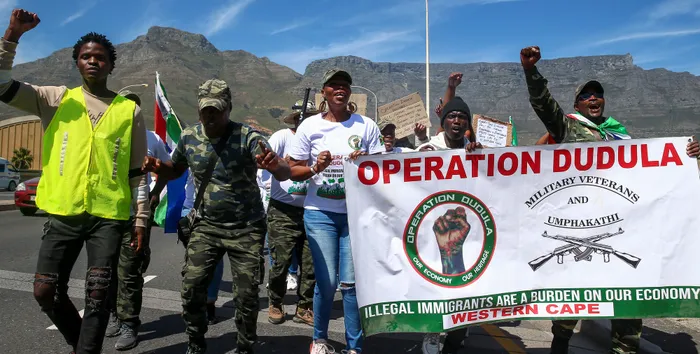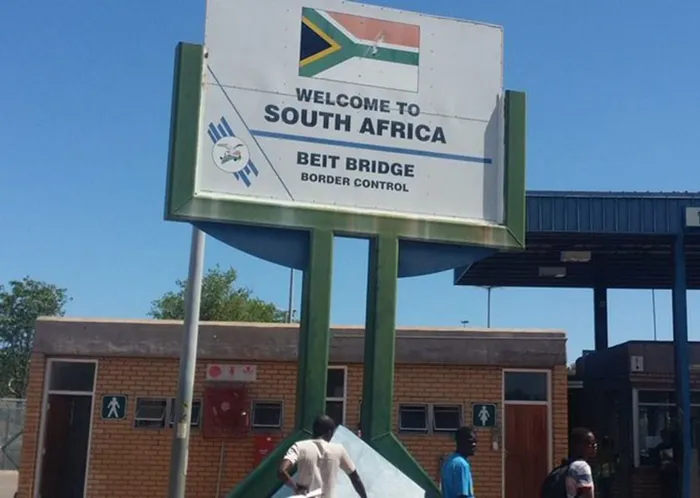Rising distrust of African immigrants could spark instability, warns Inclusive Society Institute

Operation Dudula members have held several marches against illegal immigration calling it a burden on the economy without any evidence to back it up.
Image: Leon Lestrade Independent Newspapers
A new survey conducted by the Inclusive Society Institute has raised red flags about growing distrust of immigrants, particularly foreign nationals from fellow African nations living in South Africa.
In an interview with IOL, CEO of the Inclusive Society Institute, Daryl Swanepoel, said the distrust of African immigrants in South Africa is being fueled by widespread political scapegoating, economic hardships, and fierce competition for scarce resources within local communities.
The GovDem Survey found that the employment status of South Africans appears to significantly influence attitudes towards African immigrants.
“Among those who are unemployed, 77.3% expressed distrust about immigrants from Africa. Responding to the same question, 70% of employed adult South Africans reported distrust of African immigrants. This difference suggests that joblessness may amplify concerns about competition in the labour market – actually this concern is often voiced by unemployed individuals,” said Swanepoel.
“The other driver of the distrust is the perception that government services have been overwhelmed by foreigners at the expense of local South Africans. That would be driven by heightened sentiment from civil society organisations, or the tension created by civil society organisations … instances such as blocking people from going to hospitals and blocking children of foreigners from going to schools."
He added that the activities of civil society groups against foreign nationals are heightening tensions within communities.

CEO of the Inclusive Society Institute, Daryl Swanepoel
Image: Supplied
“This is not always based on factual information. There aren’t many empirical studies that say exactly how many foreigners are in the country. What we have determined through the information that we have, and if you compare Statistics South Africa’s figures to the Department of Home Affairs, you find that there are around two million foreigners in the country.
“That is opposed to people, including senior politicians, who say the figure (of foreign nationals in South Africa) is as high as 13 or 14 million. It is still a problem, but it is a two-million problem and not a 13 or 15 million problem. When you put these big numbers out, it creates this perception that we are being swamped, and then people start becoming nervous and start distrusting,” said Swanepoel.
He warned that growing distrust is already manifesting in violent incidents.
“We are starting to see sporadic attacks on foreign nationals like Uber drivers or within townships and foreign shops that are being attacked. We also see sporadic violence, xenophobic violence starting to show its head around the country. That is our big fear and our big worry, that if this is not properly managed, it could impact social cohesion in the country and it could lead to instability,” said Swanepoel.
He added that if instability breaks out, it would automatically disrupt the South African economy and hamper investment.
The Inclusive Society Institute has called on the government to address the growing problem and foster social cohesion among people living within South Africa’s borders.
Swanepoel emphasised that South Africa has to combat illegal immigration, which has long been a challenge for law enforcement and border management authorities.
“The problem is that there is not always a difference drawn between legal immigrants and illegal immigrants. So you find that people that are in the country legally are treated the same as people that are in the country illegally. People that are in the country legally should be allowed to play their part, they bring skills, expertise, investment and so forth into the country,” he said.
“It is the illegal immigrants that we need to get a grip on.”
Regarding methodology, the Inclusive Society Institute said the GovDem Survey forms part of IPSOS’s long-standing syndicated Khayabus Survey, which is one of South Africa’s most comprehensive public opinion research programmes.
“Around 3,600 respondents were interviewed face-to-face in their homes and in their home languages. The sample was weighted to reflect the national demographics across age, race, gender, and geography. The survey carries a margin of error of around 2% determined by sample size, response rate, and sampling methodology,” the institute stated.
The findings show that distrust of foreign nationals in South Africa is not confined to any single demographic group but is shared broadly across society.

The Beitbridge port of entry
Image: Independent Newspapers Archives
“Among racial groups, Indians are marginally more critical at 75.2%, followed by black (73.2%), coloured (72.6%), and white respondents (72.5%) who indicated their distrust of African immigrants. The sentiment is therefore not isolated, but widely held across the racial spectrum. When examined by age, levels of distrust remain consistently high, although levels of distrust are the strongest from people older than fifty and from the youngest age group of 18–24-year-olds,” the survey found.
Gender also reveals a slight divergence, with 74.3% of women reporting distrust, compared to 71.4% of men. Although the difference is marginal, it indicates that negative sentiment is shared almost equally between men and women.
jonisayi.maromo@iol.co.za
IOL News